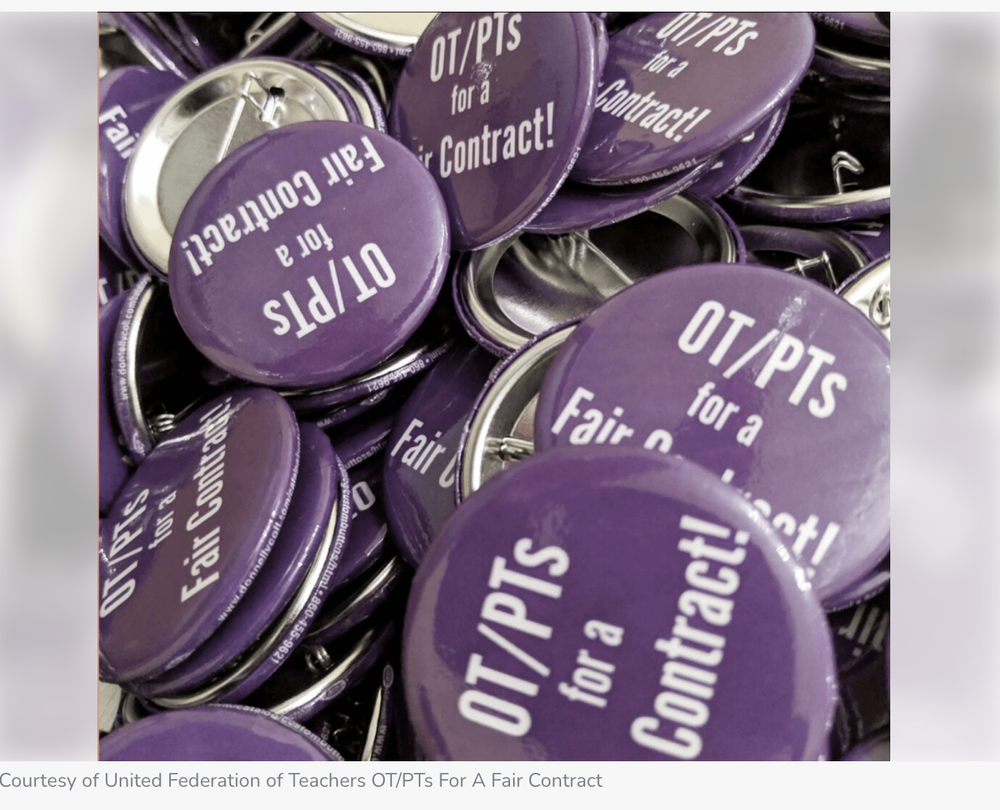Why Are School Therapists in NYC Revoting on a ‘Nothing’ Contract?
“The next step should have been to go back to the bargaining table. It was a fair and certified vote. It was not close. It was not compromised in any way.” - Alison Loebel Bertoni.
By Steve Wishnia
Almost 3,000 occupational and physical therapists [OT/PT] in New York City public schools are in the process of revoting on a contract they rejected by a 2–1 margin last month.
Officials of their chapter in the United Federation of Teachers say the union’s leadership refused to try to renegotiate the agreement, which members overall ratified by a 3–1 margin. The UFT says bargaining-unit members requested the revote.
“The next step should have been to go back to the bargaining table,” Alison Loebel Bertoni, a member of the OT/PT chapter’s executive board, told Work-Bites. “It was a fair and certified vote. It was not close. It was not compromised in any way.”
“Members of the OT/PT chapter considered possible options and next steps, and after consideration, it was the members of the chapter who asked for a revote,” UFT spokesperson Alison Gendar said.
The revote began Aug. 8, and ballots are due Aug. 29.
The bargaining unit was the only one of 12 in the UFT to reject the contract. Its members opposed ratification by 1,129-782, according to the results announced July 5. That margin covered a split among different occupations in the unit: OTs and PTs voted no by 1,074-545, while other members — school nurses, supervisors, and audiologists — voted 237-55 for ratification.
On Aug. 4, the UFT decided to put those groups of workers in a different bargaining unit. Loebel Bertoni says they had all asked to be removed.
‘Nothing for us’
“There was nothing in the contract for us,” says Mimi Greenberg, a member of the chapter’s bargaining committee.
Occupational and physical therapists work with special-education pupils. Physical therapists help them with gross motor coordination, Greenberg explains. Occupational therapists work with fine motor skills, such as whether pupils can use their hands well enough to write and use “manipulatives” such as the small blocks used to teach elementary math, and visual and perceptive skills such as being able to recognize numbers and write them.
“I don’t think the union has any interest in going back,” Alison Loebel Bertoni says. She describes UFT President Michael Mulgrew’s behavior as “dismissive” and “patronizing.” ”
Those children are “the most vulnerable people in our society,” Greenberg adds. She’s been an OT for 22 years and now works in Upper East Side schools.
Their main issue in the contract talks, she says, was parity with the other professionals who help develop the “IEPs” — individual education programs —required for each child in special education. OTs and PTs must have master’s degrees, but are paid significantly less than teachers, social workers, and speech therapists. Their top salary rate is more than $15,000 a year lower.
OTs and PTs get a 30-minute unpaid lunch, Loebel Bertoni says, while the others get a 50-minute paid break.
When the tentative agreement was revealed to the bargaining committee, Greenberg says, it included an unpleasant surprise: OTs and PTs normally do eight sessions a day, and a provision allowing them to do an optional ninth session had been added.
“It never came to the bargaining table,” Greenberg says, and chapter leaders had not been told about it. She fears that OTs and PTs will face pressure to do the extra session, or that the added workload could be used to reduce staff.
‘Scare tactics’
When the OT/PT chapter voted against the UFT’s previous contract in 2018, Loebel Bertoni says, the union “very quickly” went back to the bargaining table. They won somewhat better pay increases.
This time, she says, “I don’t think the union has any interest in going back.” She describes UFT President Michael Mulgrew’s behavior as “dismissive” and “patronizing.”
“The union tells the members this is the best we can get. We didn’t fall in line,” Loebel Bertoni says.
The OT/PT chapter is the only one in the UFT not led by the Unity Caucus, the group that has run the union since the days of Albert Shanker.
“I would expect a union leader to say, ‘you guys voted this down, there’s something wrong here, let’s try to get the city back to the table,’” Greenberg tells Work-Bites. “Instead, we got an email telling us what we would not be getting.”
“Your contract was voted down,” UFT Vice President Richard Mantell wrote in a July 10 email to chapter members. “As a result, all the new contractual benefits, including the pay increases and the $3,000 ratification bonus, will not be available for the therapists, school nurses, audiologists, and supervisors of nurses and therapists covered by this contract. You will continue to work under the terms of the previous contract.”
The latter groups got those benefits once they were separated from the OT/PT unit.
Both Greenberg and Loebel Bertoni call that message “scare tactics.” The UFT leadership said it got more than 1,000 emails from members asking for a revote after it went out, Loebel Bertoni says.
In a July meeting with chapter leaders, President Mulgrew “made it clear that the chapter had no good options,” Loebel Bertoni says; he told them that if they voted no, they wouldn’t get raises or new contract talks for years.
“They’re having a do-over on the same agreement,” Greenberg says. “Democracy has been stomped on.”

